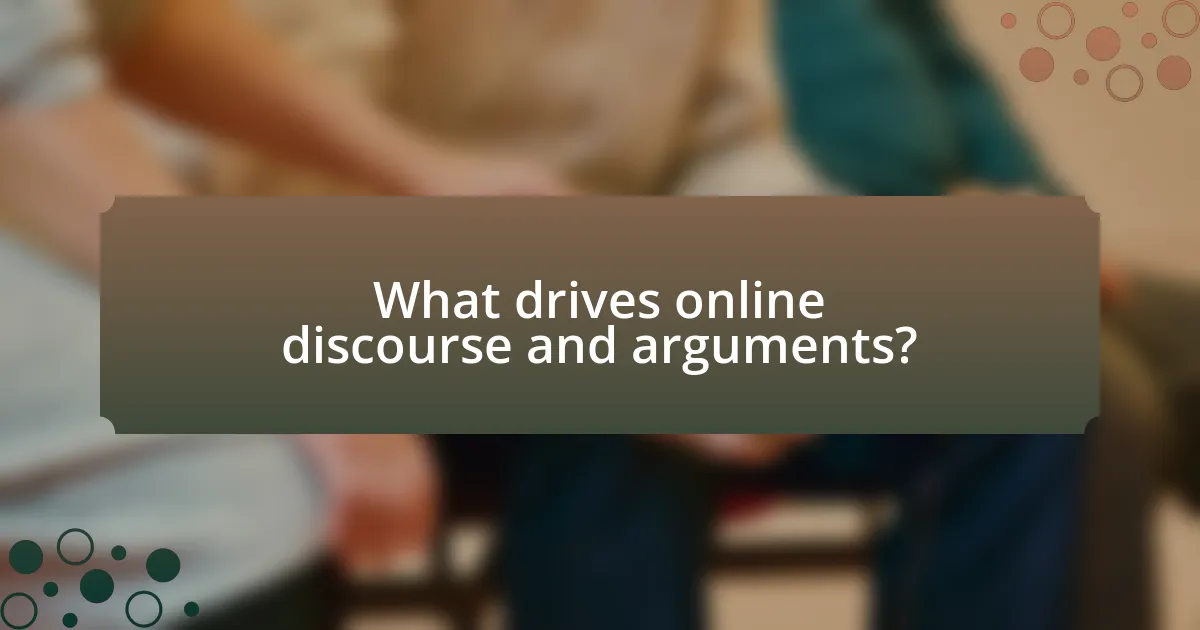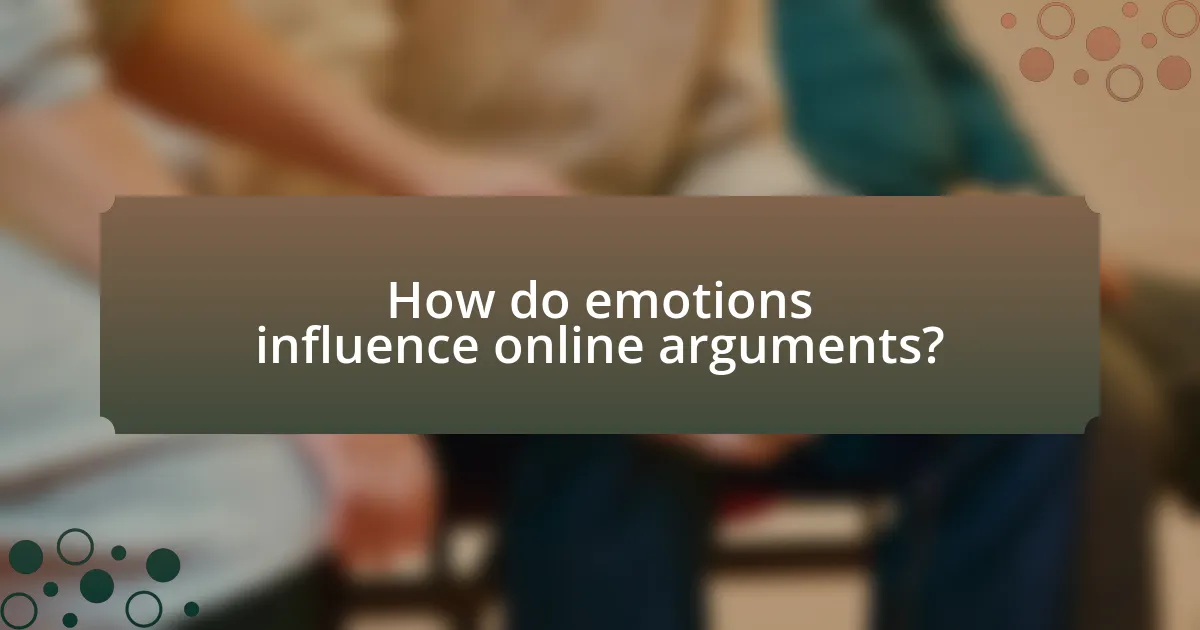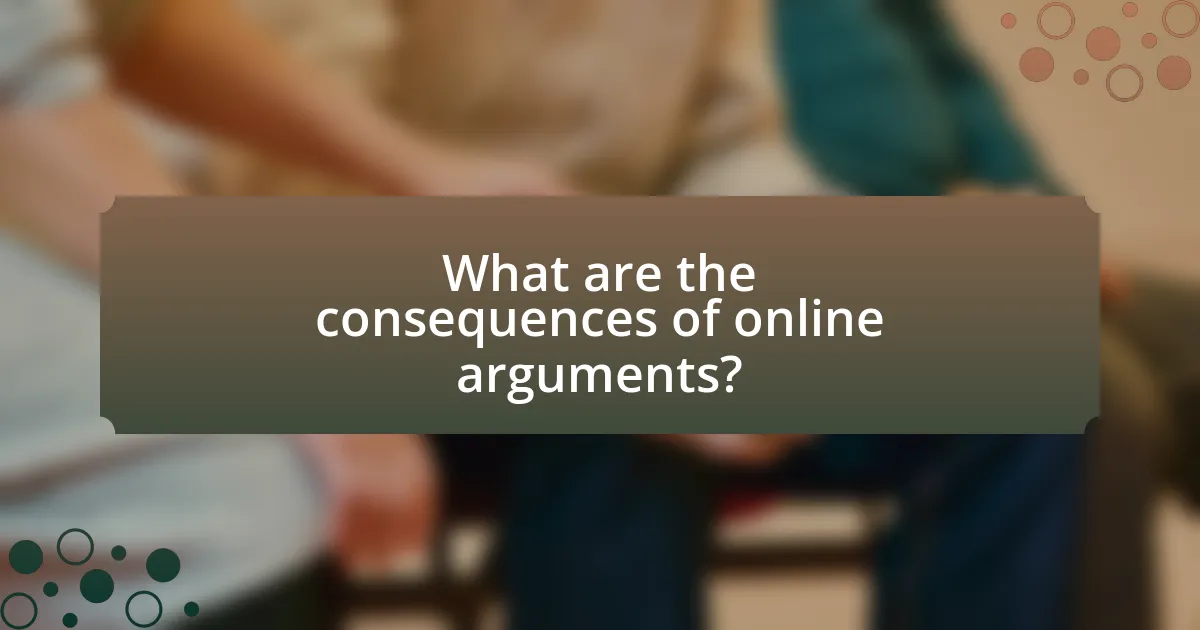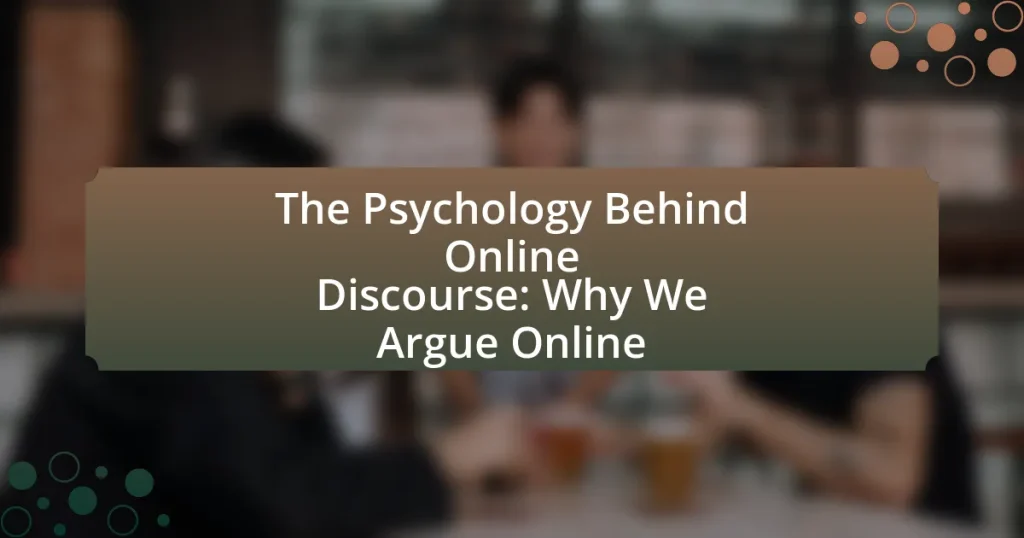The article examines the psychological factors driving online discourse and arguments, highlighting the roles of social identity, emotional engagement, and the pursuit of validation. It discusses how anonymity and the lack of non-verbal cues contribute to aggressive behavior and escalation in online interactions. Additionally, the influence of social media algorithms on the visibility of contentious content and the impact of group dynamics on argument polarization are explored. The article also addresses the emotional consequences of online arguments, including stress and relationship damage, while offering strategies for managing conflicts effectively in digital spaces.

What drives online discourse and arguments?
Online discourse and arguments are primarily driven by social identity, emotional engagement, and the desire for validation. Social identity theory suggests that individuals often align their opinions with group norms to reinforce their belongingness, leading to polarized discussions. Emotional engagement, fueled by anonymity and the immediacy of online platforms, intensifies reactions and encourages confrontational exchanges. Additionally, the pursuit of validation through likes, shares, and comments motivates users to express strong opinions, further escalating debates. Research indicates that these factors collectively create an environment where arguments thrive, as individuals seek affirmation and connection within their digital communities.
Why do people feel compelled to argue online?
People feel compelled to argue online due to a combination of anonymity, social validation, and the desire to express opinions. Anonymity allows individuals to engage without fear of real-world repercussions, which can lead to more aggressive behavior. Social validation drives users to seek affirmation for their beliefs, often resulting in confrontational exchanges to reinforce their viewpoints. Research indicates that online platforms can amplify these tendencies, as users are more likely to engage in arguments when they perceive their opinions are challenged, leading to a cycle of conflict.
What psychological factors contribute to online arguments?
Psychological factors that contribute to online arguments include anonymity, social identity, and emotional arousal. Anonymity allows individuals to express opinions without fear of repercussions, often leading to more aggressive interactions. Social identity theory suggests that individuals align with groups, which can escalate conflicts when group norms promote hostility towards opposing views. Emotional arousal, triggered by provocative content, can impair rational thinking and increase the likelihood of heated exchanges. Research indicates that these factors significantly influence online behavior, as seen in studies showing that anonymity correlates with increased aggression in digital communication.
How does anonymity influence online behavior?
Anonymity significantly influences online behavior by reducing social accountability, which often leads to increased aggression and disinhibition. Research indicates that individuals are more likely to engage in hostile or inappropriate behavior when they believe their identity is concealed. For instance, a study published in the journal “Computers in Human Behavior” by Suler (2004) highlights the “online disinhibition effect,” where anonymity allows users to express themselves more freely, often resulting in negative interactions. This lack of accountability can foster a toxic environment, as individuals may feel empowered to act without fear of repercussions.
What role does social media play in online arguments?
Social media serves as a primary platform for online arguments by facilitating immediate and widespread communication among users. It enables individuals to express differing opinions, often leading to heated debates due to the anonymity and distance it provides, which can reduce social inhibitions. Research indicates that the design of social media platforms, such as algorithms that promote engagement, can amplify contentious discussions, making arguments more visible and frequent. For instance, a study published in the journal “Nature” found that emotionally charged content, including arguments, is more likely to be shared and engaged with, thus perpetuating a cycle of conflict in online spaces.
How do algorithms affect the nature of online discourse?
Algorithms significantly shape online discourse by determining which content is prioritized and presented to users. These algorithms analyze user behavior, engagement metrics, and preferences to curate personalized feeds, often amplifying sensational or polarizing content. Research indicates that platforms like Facebook and Twitter utilize algorithms that favor emotionally charged posts, leading to increased division and conflict among users. For instance, a study by Bakshy et al. (2015) found that Facebook’s algorithm can create echo chambers, where users are predominantly exposed to viewpoints that reinforce their existing beliefs, thereby intensifying ideological divides. This algorithmic influence alters the dynamics of conversation, often resulting in more aggressive and less constructive interactions.
What impact does group dynamics have on online arguments?
Group dynamics significantly influence online arguments by shaping participants’ behaviors, attitudes, and the overall discourse environment. In online settings, individuals often conform to group norms, which can escalate conflicts or lead to polarized views. Research indicates that groupthink, a phenomenon where the desire for harmony in a group results in irrational decision-making, can exacerbate tensions in online discussions. For instance, a study published in the Journal of Communication found that group polarization occurs when individuals in a group adopt more extreme positions after discussing an issue collectively, leading to intensified arguments. Thus, the interplay of group dynamics can either facilitate constructive dialogue or contribute to hostile exchanges in online arguments.

How do emotions influence online arguments?
Emotions significantly influence online arguments by shaping individuals’ responses and engagement levels. When participants experience strong emotions such as anger or frustration, they are more likely to escalate conflicts and adopt aggressive communication styles. Research indicates that emotionally charged messages can lead to increased polarization, as individuals become entrenched in their viewpoints and less open to opposing perspectives. A study published in the journal “Computers in Human Behavior” by K. J. J. Lee and colleagues found that emotional expressions in online discussions often trigger similar emotional responses in others, further intensifying the argument. This emotional contagion can create a cycle of heightened conflict, making resolution more challenging.
What emotions are most commonly expressed in online arguments?
The emotions most commonly expressed in online arguments include anger, frustration, and defensiveness. Research indicates that these emotions often arise due to the anonymity and lack of non-verbal cues in digital communication, which can escalate conflicts. A study published in the journal “Computers in Human Behavior” by researchers at the University of California found that online interactions frequently trigger heightened emotional responses, particularly anger, as individuals feel less inhibited and more willing to express strong feelings. This emotional intensity can lead to a cycle of escalating arguments, reinforcing the prevalence of these emotions in online discourse.
How does anger shape the way people argue online?
Anger significantly influences the way people argue online by intensifying emotional responses and reducing rational discourse. When individuals express anger, they often resort to aggressive language, personal attacks, and emotional appeals rather than logical reasoning. Research indicates that anger can lead to a phenomenon known as “flaming,” where users engage in hostile interactions, often escalating conflicts rather than resolving them. A study published in the journal “Computers in Human Behavior” found that angry individuals are more likely to misinterpret neutral comments as hostile, further fueling arguments. This emotional state can create echo chambers, where participants reinforce each other’s anger, leading to polarized viewpoints and a breakdown in constructive dialogue.
What role does empathy play in online discourse?
Empathy plays a crucial role in online discourse by fostering understanding and reducing conflict among participants. When individuals express empathy, they are more likely to consider differing perspectives, which can lead to constructive dialogue rather than hostility. Research indicates that empathetic communication can decrease aggressive responses and promote cooperation in discussions, as seen in studies on online interactions where empathy was linked to more positive outcomes in conflict resolution. This suggests that empathy not only enhances the quality of conversations but also contributes to a more respectful and productive online environment.
Why do people escalate arguments online?
People escalate arguments online due to factors such as anonymity, lack of non-verbal cues, and emotional disinhibition. Anonymity allows individuals to express themselves without fear of real-world repercussions, often leading to more aggressive behavior. The absence of non-verbal cues, such as facial expressions and tone of voice, can result in misunderstandings and heightened emotions, as individuals may misinterpret the intent behind written words. Emotional disinhibition occurs when people feel less restrained in expressing their feelings online, which can amplify conflicts. Research indicates that these elements contribute to a more hostile online environment, making it easier for arguments to escalate quickly.
What triggers escalation in online discussions?
Escalation in online discussions is primarily triggered by emotional responses, particularly anger and frustration. These emotions can arise from perceived personal attacks, misunderstandings, or the use of inflammatory language. Research indicates that anonymity in online environments often exacerbates these feelings, leading individuals to express themselves more aggressively than they would in face-to-face interactions. A study by Suler (2004) highlights the “online disinhibition effect,” where individuals feel less restrained in their behavior, contributing to heightened conflict. Additionally, the presence of echo chambers can reinforce extreme viewpoints, further escalating tensions as participants become more entrenched in their positions.
How does the lack of non-verbal cues affect argument escalation?
The lack of non-verbal cues significantly increases the likelihood of argument escalation. Non-verbal communication, such as facial expressions, gestures, and tone of voice, plays a crucial role in conveying emotions and intentions. When these cues are absent, as often occurs in online discourse, misunderstandings can arise more easily, leading to heightened emotional responses and misinterpretations of intent. Research indicates that online interactions often lack the subtlety of face-to-face communication, which can exacerbate conflicts and lead to more aggressive exchanges. For instance, a study published in the journal “Computers in Human Behavior” found that individuals are more likely to misinterpret messages in text-based communication, resulting in increased hostility and argument escalation.

What are the consequences of online arguments?
Online arguments can lead to significant psychological and social consequences, including increased stress, polarization, and damage to relationships. Research indicates that engaging in online disputes often heightens emotional responses, resulting in stress and anxiety for the participants. A study published in the journal “Computers in Human Behavior” found that individuals involved in online conflicts reported higher levels of negative emotions and lower overall well-being. Additionally, online arguments can contribute to social polarization, as individuals may become entrenched in their views, leading to a divide between opposing groups. This polarization can further exacerbate societal tensions, as seen in various political and social movements. Furthermore, online arguments can harm personal relationships, as individuals may experience a breakdown in communication and trust, leading to long-term estrangement.
How do online arguments affect relationships?
Online arguments negatively affect relationships by increasing conflict and reducing trust between individuals. Research indicates that online disputes can escalate misunderstandings due to the lack of non-verbal cues, leading to heightened emotional responses. A study published in the journal “Computers in Human Behavior” found that individuals who engage in online arguments often experience feelings of frustration and resentment, which can erode the quality of their relationships over time. Furthermore, the anonymity of online platforms can lead to more aggressive behavior, as individuals may feel less accountable for their words, further straining interpersonal connections.
What impact do online disputes have on real-life interactions?
Online disputes negatively impact real-life interactions by fostering hostility and reducing empathy among individuals. Research indicates that prolonged engagement in online arguments can lead to increased polarization, making individuals less likely to engage constructively in face-to-face conversations. A study published in the journal “Computers in Human Behavior” found that individuals who frequently participate in online conflicts often carry that negativity into their real-world relationships, resulting in strained interactions and diminished social cohesion. This pattern suggests that the emotional toll of online disputes can translate into real-life behaviors, ultimately harming interpersonal relationships.
How can online arguments lead to polarization?
Online arguments can lead to polarization by reinforcing existing beliefs and creating echo chambers. When individuals engage in online debates, they often seek out information that aligns with their views, which can intensify their opinions and alienate opposing perspectives. Research indicates that social media algorithms prioritize content that generates strong emotional reactions, further entrenching users in their ideological positions. A study by Bakshy et al. (2015) found that exposure to opposing viewpoints on social media is limited, leading to increased polarization as users become more isolated in their beliefs.
What are the long-term effects of engaging in online arguments?
Engaging in online arguments can lead to long-term effects such as increased anxiety, reduced mental well-being, and a heightened sense of polarization. Research indicates that individuals who frequently participate in online disputes may experience chronic stress, which can contribute to mental health issues like depression and anxiety disorders. A study published in the journal “Computers in Human Behavior” found that frequent online conflict can exacerbate feelings of isolation and negatively impact interpersonal relationships. Additionally, prolonged exposure to contentious online environments can reinforce extreme viewpoints, leading to greater societal division and a decrease in constructive dialogue.
How does frequent arguing online affect mental health?
Frequent arguing online negatively affects mental health by increasing stress, anxiety, and feelings of isolation. Research indicates that individuals engaged in online disputes often experience heightened emotional distress, which can lead to symptoms of depression and anxiety disorders. A study published in the journal “Cyberpsychology, Behavior, and Social Networking” found that frequent exposure to online conflict correlates with increased levels of psychological distress, as individuals may internalize negative interactions and feel a lack of social support. This pattern can create a cycle where the individual becomes more withdrawn, exacerbating feelings of loneliness and further impacting their mental well-being.
What are the implications for community building in online spaces?
The implications for community building in online spaces include the potential for increased connectivity and collaboration among diverse individuals, as well as challenges related to conflict and polarization. Online platforms enable users to form communities based on shared interests, leading to the creation of supportive networks that can enhance social capital. However, the anonymity and distance provided by online interactions can also exacerbate misunderstandings and disagreements, resulting in hostile exchanges. Research indicates that online discourse often reflects and amplifies existing societal divisions, which can hinder constructive dialogue and community cohesion. For instance, a study by the Pew Research Center found that 70% of Americans believe online platforms contribute to increased political polarization, highlighting the dual-edged nature of community building in these environments.
What strategies can help manage online arguments effectively?
To manage online arguments effectively, individuals should employ strategies such as active listening, maintaining a respectful tone, and focusing on facts rather than emotions. Active listening involves acknowledging the other person’s perspective, which can de-escalate tensions and foster constructive dialogue. Maintaining a respectful tone helps prevent the argument from becoming personal or hostile, which is crucial in online interactions where misunderstandings can easily arise. Focusing on facts rather than emotions ensures that discussions remain grounded in reality, reducing the likelihood of escalation due to emotional responses. Research indicates that these strategies can lead to more productive conversations and resolution of conflicts, as they promote understanding and reduce defensiveness among participants.
